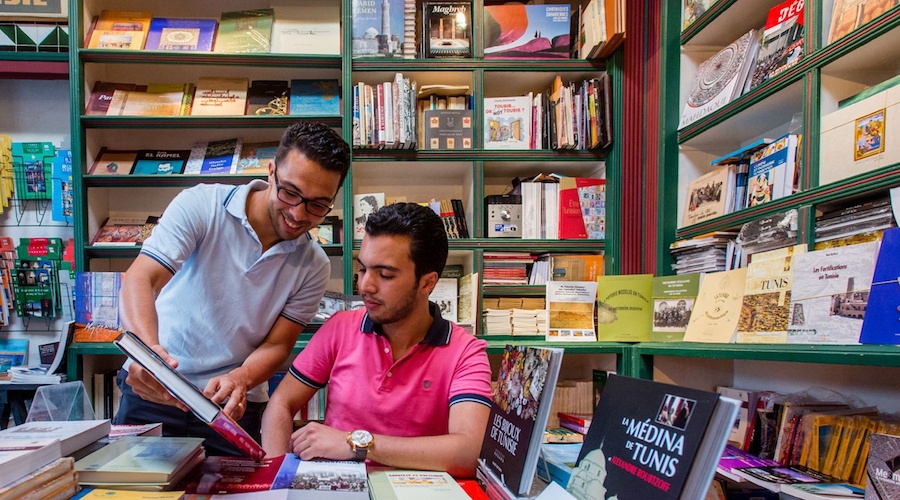Can Yallaread make peer-to-peer work in Tunisia?

The peer-to-peer sharing economy never really took off in MENA but some entrepreneurs, like Tunisian Ahmed Hadhri, still believe it’s an idea that can work here.
He cofounded Yallaread, a book swapping platform much like a digital library but without the middleman, and is working through the dilemma: is it possible to turn a peer-to-peer service into a success in the region?
Sharing, an answer to book shortage
In early May, Hadhri, a young graduate, and cofounder Christian Cochard, a seasoned French executive, launched Yallaread.
In Tunisia, it can be hard to get books, especially rare or those in foreign languages, as it’s not financially viable for bookstores to stock them.
Buying books on Amazon or Arabic equivalents such as Jamalon is extremely difficult because the Tunisian dinar is not convertible. Purchases in foreign currencies, whether done when traveling abroad or on international websites, are limited to 1,000 dinars ($400) per year for individuals.
Plus, Hadhri said book lovers who ordered books abroad often had to wait two months for delivery because of shipping hurdles, and books were sold at the same prices as in Europe, making them unaffordable for many Tunisians.

Today, four months after Yallaread’s launch, 1440 users have registered, mostly students, to borrow or lend books. Over 1,200 books have been added to the platforms by members and 210 have been exchanged.
Economics teacher Nadia Marzouki has exchanged six books since she registred in May.
“What really made me love this platform is that I can find books that I can’t generally find in Tunisia or that are very expensive, especially those on personal development, biographies, and management,” she said.
Growing a community
To borrow a book, members have to talk to the owner, set up a meeting, and then meet. Those meetings could be seen as a waste of time for some, but for others it’s part of the appeal.
“This meeting allows us to discuss about the books we exchanged and share our opinions,” Marzouki said. “This allowed me to meet amazing people.”
Many people were reluctant to share their books with strangers for fear of not getting them back or being returned in a bad state, Hadhri, who is also CEO, said.
On Yallaread, like on most peer-to-peer sharing platforms, members can share books with only their friends and are invited to rate other members.
To grow the service, Hadhri will need to gain the trust of Tunisian book lovers and to prove to them the benefits of being part of that community. He plans to organize events, such as the first which took place in July to explain the art of booktubing, or reviewing books on Youtube.
They also have a partnership with radio Express FM, to present every Sunday three books on a specific topic.

A social mission
Five years ago, when the concept of the sharing economy started to spread in the world, hopes were big. Today, the sharing economy has lost its hipness.
Specialized think tank OuiShare says we’re already after the gold rush (although in MENA the concept came too late and has struggled to find its place).
“[The sharing economy] never really worked. What really works in MENA, is on demand services - the Uber, Careem, and delivery services,” Asmaa Guedira, MENA head at OuiShare, told Wamda.
Only services with a social mission could work because they attracted users’ sympathy and were valued in the Arab culture.
Being a social project was also an advantage in terms of funding because if investors willing to fund startups were rare, foundations looking to fund social projects were in no shortage, she said.
It’s lucky then Hadhri sees Yallaread as a social enterprise.
“We work on making reading and culture in general more accessible. If we fix this issue, we’ll fix other problems like unemployment,” he told Wamda.
The entrepreneur is preparing a reading promotion campaign and talking to the Ministry of Culture to join.
The challenge of the scale factor
But they can only complete this mission if the service is financially viable.
Traditionally, sharing platforms, such as carpooling and clothing loaning, monetize by taking a fee on interactions or selling additional services. The value, and consequently the fees, of interactions tends to be small so those websites need a critical mass of deals to be profitable.
To obtain scale effects, Hadhri will have to convince more people to read in order to make money on possible, and as yet unspecified, premium options.
“I don’t think there will be scale effects [for Yallaread] but it could seduce a niche,” said OuiShare’s Guedia, noting that ‘collaboration consumption’ was a phenomenon reserved for an educated and internet-educated minority, and that reading was a niche activity in the Arab world.
“It will start slow,” Guedira said. “If there’s a good fan club, it could work because culture is sexy in the region.”
Economics teacher Marzouki said reading and book fans were “multiplying”.
“The concept of Yallaread has helped a lot in the sense that it has encouraged people to read without having to spend money.”
The founder is also hoping to get more members by expanding to the rest of MENA, starting with Egypt and Morocco.
Whatever happens, Hadhri will need to look beyond fees on book exchanges and premium options. He plans on offering advertising services to book stores, publishing houses and cultural centers.
“I think this is the only viable business model for him,” Guedira said.
The entrepreneur is currently looking for funds to launch Arabic and English versions of the website and invest in marketing.
The success of peer-to-peer businesses like Yallaread will come down to the capacity of a few entrepreneurs to lead and understand the market, and execute.


